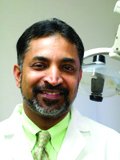
More Dental Health Articles
Gum Disease Is All Too Common
Healthy gums are vital for maintaining your teeth. Unfortunately, gum diseaseaffects nearly everyone at some point in their lives.
An infection of the tissues that surround and support your teeth, gum disease is a major cause of tooth loss in adults and has been linked to other serious conditions including strokes and diabetes. Also referred to as periodontal disease, gum disease is caused by plaque, the sticky film of bacteria that is constantly forming on our teeth.
While some people are genetically more prone to severe gum disease than others, poor oral hygiene and smoking are two significant risk factors associated with the development of plaque. Additionally, smoking can lower the chances for successful treatment.
Because gum disease is usually painless, you may not be immediately aware that you have it as such you should know the signs and symptoms of gum disease, and you should alert your dentist if you suspect having gum disease. By having your gum disease diagnosed and treated early, you greatly improve the odds of having a positive outcome and reversing any damage from gum disease.
The early stage of gum disease is called gingivitis. If you have gingivitis, your gums may become red, swollen and bleed easily. At this stage, the disease is usually easy to reverse and can usually be eliminated by a routine professional dental cleaning, followed by daily brushing and flossing. If gingivitis goes untreated, the inflammation can invade connective tissue and even bone. This causes periodontitis.
Chronic periodontitis can lead to the loss of tissue and bone that support the teeth and it may become more severe over time. If it does, your teeth will feel loose and start moving around in your mouth.
Aggressive periodontitis is a hi-ghly destructive form of periodontal disease that occurs in patients who are otherwise healthy. Common features include rapid loss of tissue and bone and may occur in just some areas of the mouth, or in the entire mouth.
Treating periodontitis is more complex than treating gingivitis, because the inflammation invades below the gum line. You'll need special care from a dentist and need to be especially vigilant in your home care to treat periodontitis.
Other Articles You May Find of Interest...
- Let’s Smile Dental’s 7&Up Club
- Strengthening Smiles: Understanding the Importance of Splinting Periodontally Involved Teeth
- Understanding Soft Tissue Grafting: A Key To Periodontal Health
- New Solutions for Dentures and Dental Implants
- Can You Benefit From Braces?
- Benefits Of Immediate Dental Implants
- Preventing Tooth Injuries During Your Child’s Active Summer

















